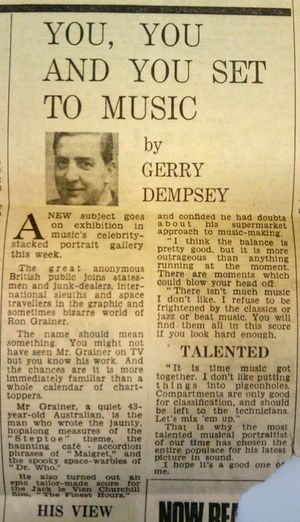You, You and You Set To Music
You, You and You Set To Music is a newspaper article by Gerry Dempsey announcing the opening night of Ron Grainer's play On The Level, for which Delia and Unit Delta Plus provided music and sound effects.
Transcript
YOU, YOU AND YOU SET TO MUSIC
by GERRY DEMPSEY
A new subject goes on exhibition in music's celebrity-stacked portrait gallery this week.
The great anonymous British public joins statesmen and junk-dealers, international sleuths and space travellers in the graphic and sometimes bizarre world of Ron Grainer.
The name should mean something. You might not have seen Mr. Grainer on TV but you know his work. And the chances are it is more immediately familiar than a whole calendar of chart-toppers.
Mr. Grainer, a quiet 43-year-old Australian, is the man who wrote the jaunty, hopalong measures of the “Steptoe” theme, the haunting café-accordion phrases of “Maigret,” and the spooky space-warbles of “Dr. Who.”
He also turned out an epic tailor-made score for the Jack le Vien Churchill film, “The Finest Hours.”
And yesterday Mr. Grainer came North with a 38-item, 75-minute surprise package that could revolutionise the British musical stage.
“On the Level,” the composer's second big-show collaboration with author Ronald Miller--their first, “Robert and Elizabeth,” is still running in London--opens at Liverpool's Royal Court Theatre on Friday.
The story concerns teenagers and parents involved in a nation-wide examination scandal, and takes in, according to the advance blurb, “teenage love, parental greed, and bungling officialdom.”
Mr. Grainer sees us as a beat-happy, ballad-mongering, syrupy-nostalgic, classically-conscious, and frankly noisy crew.
“What I have tried to do is to reflect in the score the kind of music people like in their home. It is a portrait in sound of today's tastes.
“It is probably not what you would expect in a show. A lot is based on classics and big-band music as well as pop and jazz.
“There is a big choral number that is straight Bach or Handel, and a ‘rave’ spot by a stage choir -- and I don't think that's been done before.
“I mean there's an awful lot of music around at the moment. More than people have ever known before. You just can't play it quite.
“The parents are given music in the style of a Glen Miller parody. That is their thing against the kids. The youngsters belt out the ravingest pop and modern jazz. That is their kind of defiance.
So to complete the image, there must be elements of the classics, and because it is 1966 electronic music in the “Dr Who” vein which owes nothing to the men in the orchestra pit.
Mr. Grainer downed a second campari-and-soda, and confided he had doubts about his supermarket approach to music-making.
“I think the balance is pretty good, but it is more outrageous than anything running at the moment. There are moments which could blow your head off.
“There isn't much music I don't like. I refuse to be frightened by the classics or jazz or beat music. You will find them all in this score if you look hard enough.
“It is time music got together. I don't like putting thing into pigeonholes. Compartments are only good for classification, and should be left to the technicians. Let's mix 'em up.”
That is why the most talented musical portraitist of our time has chosen the entire populace for his latest picture in sound.
I hope it's a good one of me.

